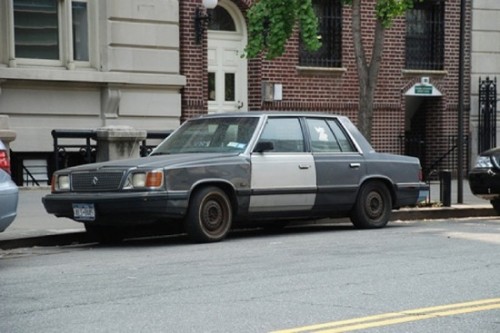Is it Time to Finally Fix Your Old Car, Or Buy a New One?
If you love your raggedy old car, despite that it constantly stalls, breaks down, and refuses to start, it’s likely due to sentimental reasons. After all, you’ve made some great memories during those 350,000 kilometres, and we are all fans of nostalgia. But eventually, it gets to the point where you wonder if you should continue sinking money into repairs every couple of months, or finally consider purchasing a newer, safer, but also more expensive, vehicle?
How Do You Know When it’s Worth It?
 It’s a tough question, as many factors come into play. If your car loan is already paid off, your credit is in good standing, and you have some money saved in the bank, then finally saying au revoir to your old car – which is costing you as much money in repairs as you’d be paying on financing/leasing a new car – seems pretty obvious.
It’s a tough question, as many factors come into play. If your car loan is already paid off, your credit is in good standing, and you have some money saved in the bank, then finally saying au revoir to your old car – which is costing you as much money in repairs as you’d be paying on financing/leasing a new car – seems pretty obvious.
But it all depends on your own personal situation. Basically, it’s just doing math. Even with a bad credit score, it still may make more sense to buy a new car (that is, if your old car is literally costing you an arm and a leg). You should also remember that insurance agencies look at your car’s history, so if it’s been involved in several accidents (see here for what to do, and not to do, after being involved in a car accident), a new car may be cheaper to insure.
If possible, it would be ideal not to wait until your old car forces a decision on you with a huge repair bill, as the stress of a big, unexpected repair makes your real options seem fewer and more expensive than they need to be. It’s better to assess your car’s actual age and mileage before that happens – over 150,000 km is a turning point for most vehicles.
While you’re at it, consider your car’s repair history — especially ‘milestone’ repairs like a complete major brake job, timing belt replacement, and persistent radiator or transmission leaks that may be signaling the end of their usable life just from normal wear-and-tear.
Take Good Care of Your Car
If it’s gotten to the point that even routine maintenance runs you a few hundred bucks, and you know your car needs additional repairs that will run you hundreds, or even thousands of dollars, it may be time to finally retire your ride, obtain an auto loan (if you need it), and buy a new car (whether used or brand new). And of course, if you happen to have bad credit, then you’ve come to the right place by visiting Auto Loan Solutions. After all, helping out people with poor, or no, credit is our specialty.
Even with Toronto’s extreme weather swings (here’s some tips for safe winter driving), a well-cared-for vehicle should still be running long after the odometer has clocked 161,000 kilometres, as long as it’s been regularly and properly maintained. That’s why manufacturers prepare a maintenance schedule for their vehicles. As it turns out, doing simple things like changing the filters and engine oil 3 or 4 times per year actually extends the life expectancy AND efficiency of a car — FAR beyond their nominal costs might suggest!
Here’s a fun fact:
A Maine man’s 1990 Honda Accord topped one million miles in the fall of 2012, a milestone the car company celebrated by giving owner Joe LoCicero a brand new 2012 Honda Accord. It was the first milestone of its kind on record for the Japanese car manufacturer, so they asked LoCicero how he managed to keep his ride chugging along for so many years.

Joe LoCicero and his wife, Sharon, wave at a surprise parade honoring his one-million-mile 1990 Honda Accord (Photo: Portland Press Herald)
According to LoCicero, he followed his owner’s manual and maintenance schedule to the letter, checked and switched the car’s fluids regularly, and never allowed his oil to drop below a quart low on the dipstick. He proved that regular maintenance is a way to add value to your car, and can help you avoid costly repairs and add years of life to your vehicle.
If you’re willing to put in the time and effort to maintain a car — especially if you’re a DIY type — maintaining or buying an older used car is probably the best financial move for you. Of course, bigger issues that you’re not comfortable handing on your own (or that you don’t consider to be worth your time versus the money it costs to pay for an expert’s help) should be handled by a good, honest mechanic that you trust.
However, if you tend to procrastinate and skip regular maintenance, driving an older car may not be the best decision for your budget OR your lifestyle.
The Other Costs of Wear and Tear
You see, even if you take good care of your car, some-high priced repairs are unavoidable. Wearable items such as axle boots, tires and brake rotors eventually need to be replaced. And when you finally need to replace those items, it can signal the end of the ‘natural’ life expectancy of larger components too, and an impending drop in the overall reliability of the vehicle.
For example, one of the more expensive and inevitable repairs on a high-mileage car is the timing belt. On many cars, it needs to be replaced at around 100,000 – 120,000 km. At the same time, most dealers recommend that a car owner should also replace the water pump and other drive belts at this point, too. So this “timing belt package” can typically cost between $600 and $1,000 every 4-6 years.
 That’s why you don’t want to wait until something BIG goes wrong with your car — you need a new engine, for example — and you’re faced with another gigantic repair bill before figuring out if it’s worth it. Especially if this isn’t the first time it’s happened, and you’re getting tired of pouring money into an aging machine, you probably realize that maintenance costs on an older car or truck are unlikely to go down as it ages.
That’s why you don’t want to wait until something BIG goes wrong with your car — you need a new engine, for example — and you’re faced with another gigantic repair bill before figuring out if it’s worth it. Especially if this isn’t the first time it’s happened, and you’re getting tired of pouring money into an aging machine, you probably realize that maintenance costs on an older car or truck are unlikely to go down as it ages.
Car Repair vs. Car Loan
Here’s a guideline that can help you decide: if the cost of repairs is greater than either the actual ‘black book’ value of the vehicle or of one year’s worth of monthly payments, it’s probably time to buy another vehicle. Remember, your car doesn’t survive on ‘hope’ or ‘good karma’ – which means repairing one thing doesn’t guarantee that another breakdown won’t happen again down the line.
When you don’t want to worry constantly about future breakdowns, think of a high-mileage car like a 40-year-old pitcher for a baseball team: his arm could go out in one pitch. If you buy a new car, you’ll have at least three to five years — often longer — before you have to pay for any major repairs again. Some new cars even come with free standard maintenance included in their price.
How Much Could You Save in Gas?
Here’s a question that applies to new AND old cars alike: is your current vehicle a gas hog?
Newer cars typically get better mileage these days, which can save you a lot of money over time. To compare the mileage of your current car to a newer model vehicle, simply enter the current price of gas, the kilometres per litre, and the average number of kilometres you drive per year to find out which car will save you more at the pump. You’ll see a real-life illustration of just how far your daily-driver dollars go.
But the actual cost of the car isn’t the only ACTUAL value here, is it? The more your ‘Old Faithful’ car is in the shop, the more it breaks down, leaves you stranded, makes you nervous about missing appointments and the potential safety hazards of driving it in traffic, the more you’ll seriously consider replacing your car with something nicer. And don’t even get us started on that wide, dark oil slick growing on your driveway.
At this point, you’ll have to ask yourself this question: if an undependable car breaks down, how are you going to get around? There’s the cost of a rental car, bus, train, and taxi fares, to name a few, all of which are pretty expensive, especially if you commute to work. These costs add up quickly, even if your car decides not to start only once or twice a month. Plus, the fact that the TTC is one of the more expensive transit systems in Canada doesn’t make the alternative all too appealing.
Does Driving a Nicer Car Make You More Money?
 If you’re a professional lawyer, sales executive or James Bond type, a car can be part of your brand value. Driving a nice-looking vehicle could potentially boost your credibility and professional image in the eyes of some clients – though we certainly don’t recommend it for anyone with poor credit. So in addition to the monthly payment on a newer car, you’ll want to consider intangibles, including safety features and professional demands.
If you’re a professional lawyer, sales executive or James Bond type, a car can be part of your brand value. Driving a nice-looking vehicle could potentially boost your credibility and professional image in the eyes of some clients – though we certainly don’t recommend it for anyone with poor credit. So in addition to the monthly payment on a newer car, you’ll want to consider intangibles, including safety features and professional demands.
Meanwhile, the money you save by not buying a new car tends to be eaten up by the growing cost of keeping the old one on the road… especially when you include the cost of alternate or emergency transportation, missed appointments, and all that wasted time spent on waiting, worrying and re-scheduling to make your life fit around your car’s schedule.
How Much Are You Paying for Financing, Maintenance and Operating Costs?
Finally, consider this if your car isn’t completely paid off: if you’re still making car payments and you think that your maintenance costs are higher than another vehicle with a similar car loan payment, you may be better off getting a new car. Of course, you’ll trade off any money you’ve already put into paying off your existing vehicle, so look for a good dealer trade-in value where you can.
After all, the overall payments may fit into your budget more easily (especially with today’s low interest rates, even on bad credit car loans). If you make the decision while the car still has some value, you can sell it or trade it in, transforming it into a down payment on your next car. If you’re also able to take advantage of incentives and rebates being offered by many car dealers today, you may find that a new car is within reach for you.
It’s hard to put a dollar value on the satisfaction and peace of mind that a new vehicle can bring. Comfort, dependability and reliability are worth a lot – mentally, emotionally AND financially!
Curious about a new car to fit your budget AND your lifestyle? Check out Auto Loan Solutions today! Or even better, visit our Facebook page for user testimonials, financial tips, and more.






